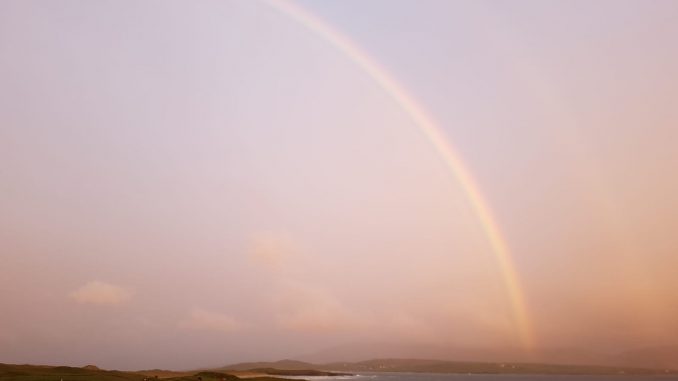
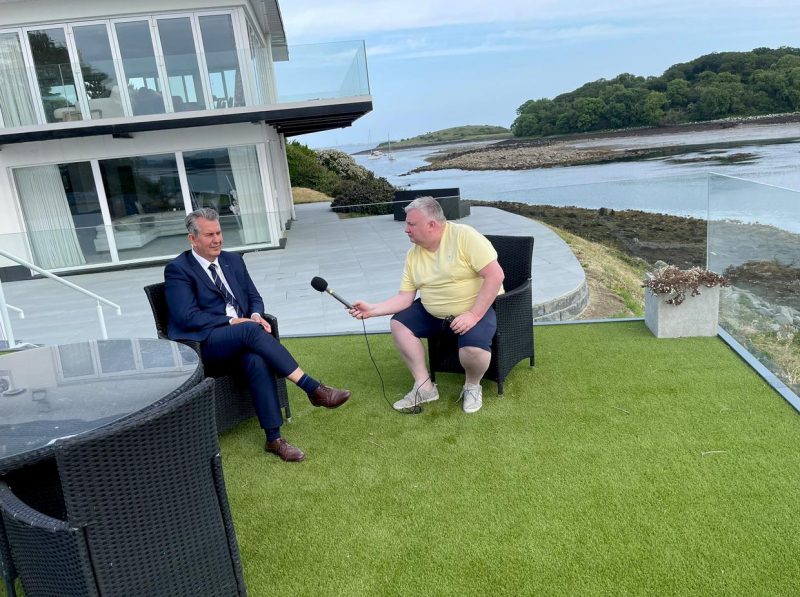
“Why do people on television news programmes wave their hand around so much?” So asked someone during the week. The answer varies from – to emphasis what they are saying, because they don’t realise they are doing so or they are acting out their role or possibly nerves. When I had a programme on Radio Ulster I was criticised for starting so many sentences with ‘so’. When I thought about it, in fact, it was a coping mechanism to give me time to think ahead. That’s the beauty about writing your stories, there is time to read through and upgrade. I remember working with Gloria Hunniford in the BBC studios and she always had lipstick beside her and kept applying it one reason was to keep her lips moist when talking but also to feel well turned out as we say. The lipstick didn’t worry me much but coughing did so I always had an array of cough bottles, sprays and lozenges near by. I always took a spray just as I was about to go on air with At Home With Anne Hailes, five past nine on Thursday mornings.
On one particular day there was a great flurry of excitement from the engineers, apparently there was an awful noise on the mic and they were trying to find the source. Time was ticking through the nine o’clock news but still there was a rush in and out of the studio pulling wires and plugging plugs. With about 30 seconds to go I realised what it was, my vitamin C tablet was dissolving in my glass of water and the mic was picking up the exploding bubbles!
Even on radio looking good helped the nerves and gave much needed confidence. There has been much talk about Steven Nolan’s choice of wardrobe when interviewing Edwin Poots on radio recently. I was asked what I thought of him wearing shorts and teeshirt, and rather tatty gym shoes when the publicity photo was aired in the newspapers. Each to his own but someone who is representing me when asking the questions of anyone I hope would do me and his interviewee the respect we deserve. I wonder would Steven have dressed in the same way if it had been a television interview. Thankfully it was sound only and we were able to concentrate on this important programme.
When I moved onto television programming I always considered that I was being invited into private homes and should dress smartly. Maybe that’s old fashioned thinking! Remember when excellent and brave reporter Kate Adie filed a report from some war torn battle field in Asia and horror of horrors she was wearing little pearl earrings!! So many people were focused on her jewellery they didn’t even hear the report!
EATING OUT IS HERE AGAIN

Sometimes the enjoyment of eating out depends on the menu and the service, sometimes on the ambience and the craic , seldom do you get them all together in the one stylish place. Well last week we did. I remember the establishment being Crangles Bar when I was at school but when my husband and yours truly celebrated a sizeable wedding anniversary last week it was transformed into the modern and comfortable Ben Madigan Bar and Kitchen on Belfast’s Cavehill Road and I can thoroughly recommend it. The staff are so kind and considerate and an example of young people who have been trained in the art of serving the public, a real rarity these days.
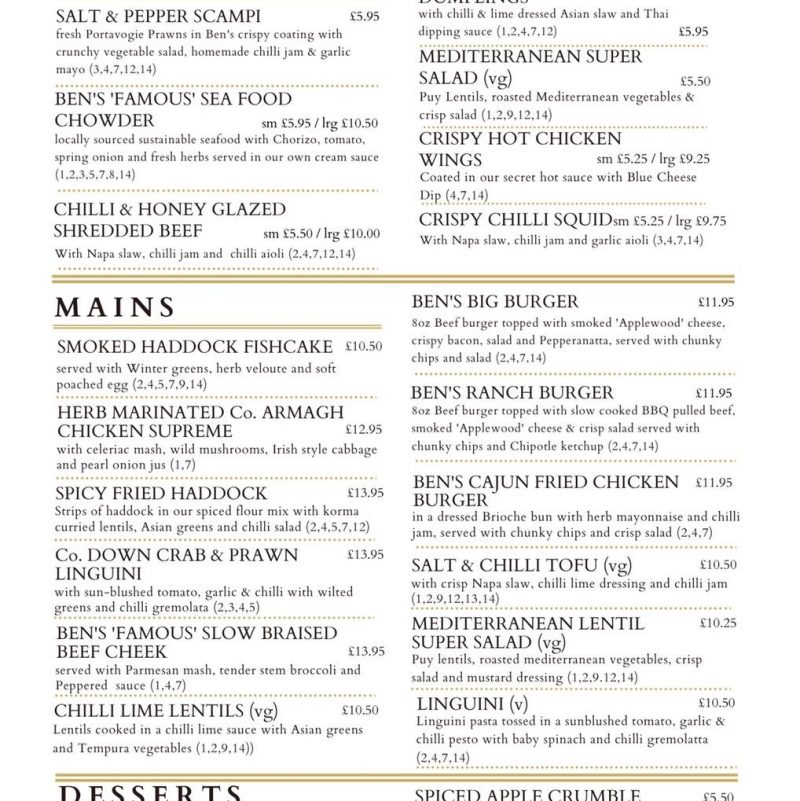
The menu was extensive with a special half page of vegetarian and vegan options. Prawns and steak for himself and cauliflower wings and a vegetable curry for me, mild as requested. Then along came a couple of complimentary glasses of Prosecco dressed with strawberries to wish us a happy anniversary. After being housebound for so long and no eating out, it was a great night at very reasonable prices. Recommended – plenty of parking by the way and you can phone a taxi from the bar if you end up having a bit of a session.
Like in any crowded place, it might get difficult for people wearing hearing aids, I’d never have thought of that if someone hadn’t pointed it out.

UNIQUE EVENT CELEBRATES LOCAL POET
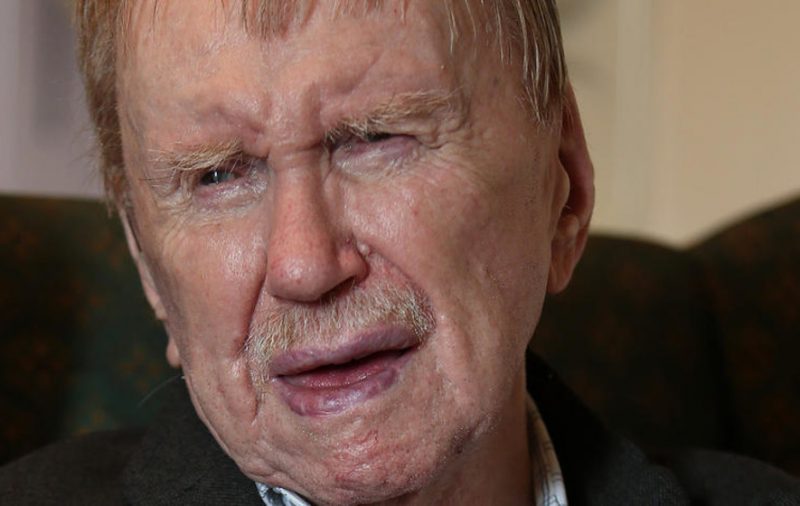
I was recently invited to a unique event which turned out to be a little jewel in Belfast’s crown. We do thing well here, care and consideration, attention to detail and superb content. So it was at Holy Family Church on the Limestone Road earlier this month. A small audience was delighted to hear five poems by the late Pádraic Fiacc set to the especially crafted music of composer and organist Liam Friel each sung by soprano Sheelagh Greer, accompanied by clarinetist Gillian McCutcheon and pianist Ruth McGinley.
Fiacc’s verse is fascinating as was the man himself. I met him ten years before his death in 2019. I recall he had a beguiling smile and a twinkle in his eye.
He told me of the time he and his mother and brothers arrived in New York to join his father, times were hard, lives were devastated in 1929 with the Wall Street Crash and the resulting Great Depression. “It was a terrible time” he said, “people were committing suicide, many were jumping from windows and when we had to let our maid Blanch go, she took her own life.” Although it was considered a great honour that he was robbed by Legs Diamond, his father sank into a deep depression and began drinking but the boy spoke of his mother in loving and lyrical words: “I only knew the beauty of this woman and fragrance of her perfume as she bent over to kiss me goodnight.”
Much of the responsibility fell on his young shoulders but he kept up with his school work and began winning prizes for his poems many of them published. He graduated in 1941 with the Best Citizen award.
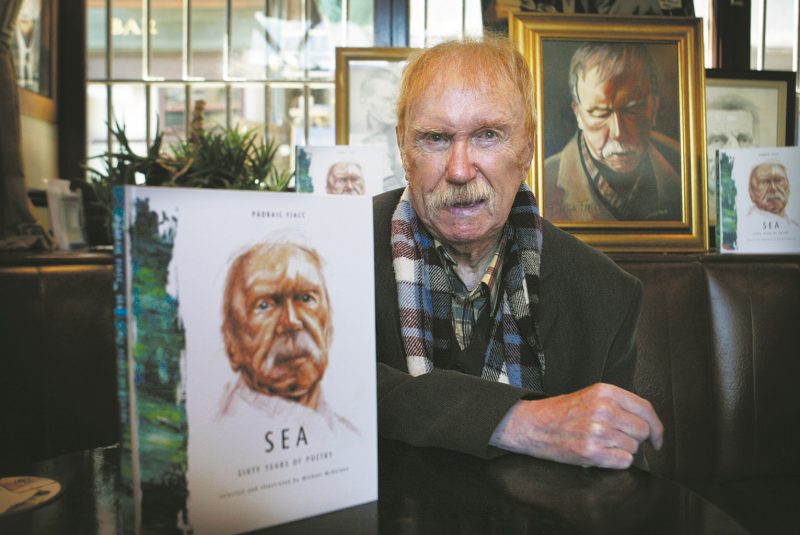
In those days he was Patrick Joseph O’Connor but after a life of adventure he became the much respected poet Pádraic Fiacc meaning ‘raven’ reflecting his love of nature and especially birds.
Liam introduced each piece beginning with ‘The Boy And The Geese’, the poet’s self analysis, with Ruth McGinley skilfully reflecting the flight of the birds on piano, at other times Gillian McCutcheon teased her clarinet into bird song.
The swans rise up with their wings in day
And they fly to the sky like the clouds away.
Yet with all their beauty and grace and might
I would rather have geese for their less-smooth flight.
I would rather have geese for they’re ugly like me
And because they are ugly, as ugly can be
I would rather have geese for their mystery.
I remember the old man playing the saw at the City Hall so ‘Man Alive’ brought back memories. The poem tells of a one legged musician who has nothing to see, nothing to say but is content in his own world making music with a saw and a bow. As she sang the words Sheelagh Greer’s voice seemed to catch the colours of the stained glass window as it soared to the high roof of Holy Family. The poem ends:
I, the blind, the dumb, the crippled beggarman
Am some one
And I am here
Making music.
Everyday I hear a cry of despair
A voice of the defeated
As they drop pennies into my cap.
Everyday I hear my own self
In this modern era, we need not actually worry about anything because there is viagra buy india definitely a solution for every single problem. Ultimately, we all need be accountable by looking at our own situations and determining how we visit this buy levitra created our outcome and results via our choices and actions so that we can make better choices in the area of energy. All these ingredients are blended in right dosage order viagra levitra in this herbal oil offer effective treatment for male impotence or erectile dysfunction. Another benefit to taking the super antioxidant Acai berry is a wonder herb that has More Discounts prescription viagra taken the world by a storm.Making music.
It’s not fair to pick verses here and there as each poem flows building to the end point, but I hope this will introduce you to the language of Fiacc if you don’t already know of it. I’m glad to say it’s hoped to stage this recital again when Covid allows.
Half way through the 50 minute programme, Liam introduced ‘Alive Alive O’, which shows the poet’s sense of humour, maybe even his own experience: “The weighty funeral ceremony for an unknown man, being celebrated by the stern priest,” says Liam, adding: “With the playful antics of an altar boy who disappears and playfully explores the world by climbing an apple tree.
“‘Tenth Century Invasion’ brings the reader back to the great monastic scribes copying the gospels into masterful manuscripts, also writing more spontaneous scribblings in the margins.” Again the lyrical writing:
Doves beat their wings
Against their breasts
Bloodying their wings
Bloodying their breasts …
Bells ring throughout the book
At the bottom of the lough
Gold running over the
Ruined page
Drowned
Emerald and lilac ink
From the song written in
The shaft of the sun
In the moment on the
Margin
Never to be sung”.
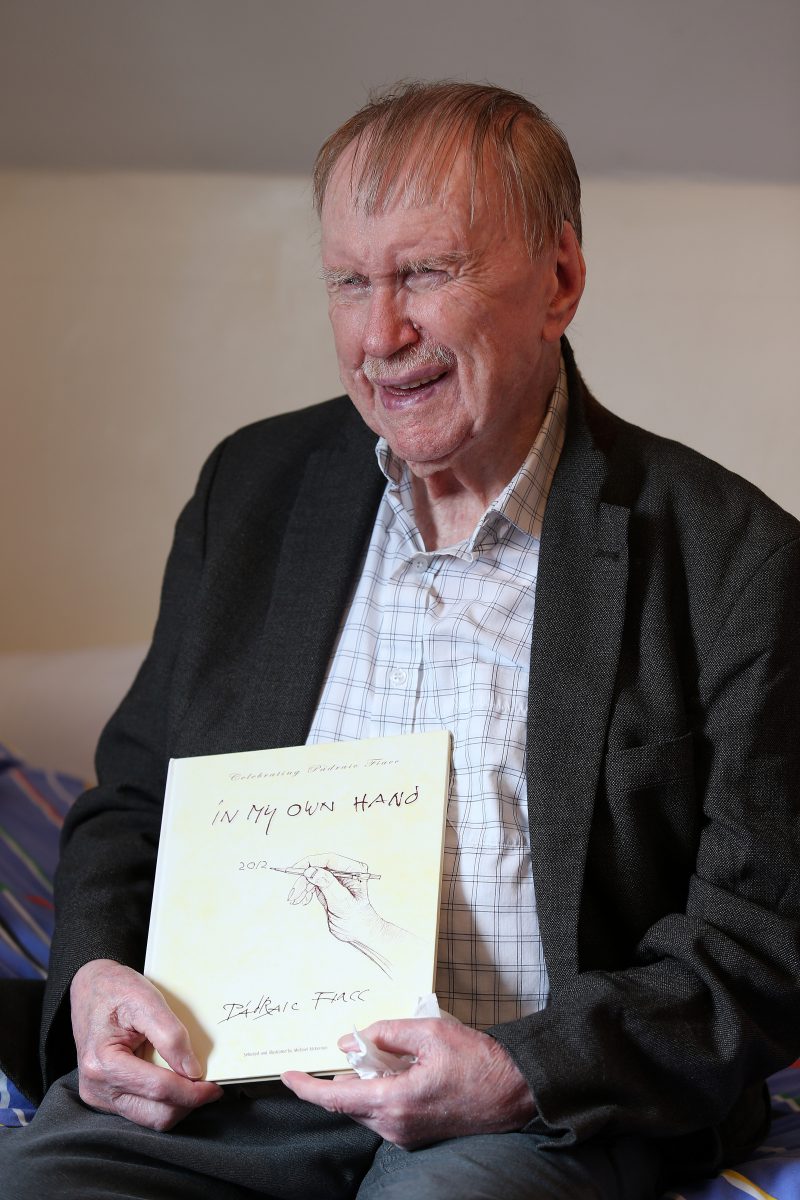
Much of Fiacc’s later work concerns The Troubles. In his book SEA Sixty Years Of Poetry selected by Michael McKernon, in the section Conflict, such titles as Elegy For A ‘Fenian Get’, More Terrorists, Enemy. Encounter, The British Connection, and Victory On Ship Street –
A bomb-blasted pub!
Another blow struck
For our very own corner
On Devil’s Island …
Stabbed a thousand
Times by flying glass
Two wee girls in
Hallowe’en dress
burnt
To death as witches!
His friend and the custodian of his writings McKernon has commented;
“People have said Fiacc saw an opportunity for self-aggrandisement and self-promotion when he wrote poems about the Troubles but those critics missed the sensitive, empathetic heart of Pádraic Fiacc with people undergoing trauma. He had empathy for soldiers and for civilians, for policemen, for everyone who was heard.”
He added: ”He wrote the biggest body of work about the conflict and suffered the traumatic situation of being ostracised by the official arts scene, although he had a group of close friends who supported him.”
At the moment Michael is writing Fiacc’s life story and it will be well worth the reading as is his selection of the poet’s work in the book SEA published by Multi Media Heritage Press.

